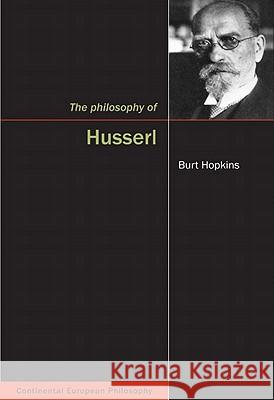The Philosophy of Husserl » książka
The Philosophy of Husserl
ISBN-13: 9780773538238 / Angielski / Miękka / 2011 / 290 str.
Hopkins begins his study with Plato's written and unwritten theories of eide and Aristotle's criticism of both. He then traces Husserl's early investigations into the formation of mathematical and logical concepts, charting the critical necessity that leads from descriptive psychology to transcendentally pure phenomenology. An investigation of the movement of Husserl's phenomenology of transcendental consciousness to that of monadological intersubjectivity follows. Hopkins then presents the final stage of the development of Husserl's thought, which situates monadological intersubjectivity within the context of the historical a priori constitutive of all meaning. An exposition of the unwarranted historical presuppositions that guide Heidegger's fundamental ontological and Derrida's deconstructive criticisms of Husserl's transcendental phenomenology concludes the book. By following Husserl's personal trajectory Hopkins is able to show the unity of Husserl's philosophical enterprise, challenging the prevailing view that Husserl's late turn to history is inconsistent with his earlier attempts to establish phenomenology as a pure science. Contents: Introduction Part I Descriptive Psychology 1. Investigation of the Origin of Number 2. Investigation of the Origin of Logical Signification Part II Cartesian Transcendental Phenomenology 3. Investigation of the Origin of Objective Transcendence 4. Investigation of the Origin of Subjective Transcendence Part III Historical Transcendental Phenomenology 5. The Crisis of Meaning in Contemporary European Science 6. Historical Investigation of the Phenomenological Origin Part IV Husserl and his Critics 7. Fundamental Critiques of Transcendental Phenomenology 8. A Husserlian Response to the Critics"











